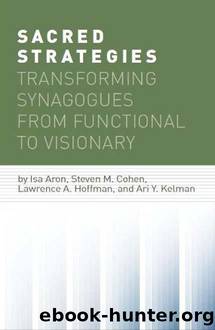Sacred Strategies by unknow

Author:unknow
Language: eng
Format: epub
Publisher: Rowman & Littlefield Unlimited Model
Building Community 2: Kiddush Matters
Following the logic of relational organizing means attending to individual relationships. For the IAF and Temple Israel, this means highly structured, if personal, conversations that often takes place within a larger campaign or other such framework. However, relational organizing can also happen in less structured environmentsâless structured, as opposed to unstructured. Insofar as we are talking about building communities, the congregation provides a framework for social interaction, but often that is not sufficient for building the relationships that fuel thriving communities.
For smaller congregations and minyanim, meaningful interaction is relatively simple because there are simply fewer people who tend to be more homogeneous. Long-time members of Temple Micah and Beth Jacob speak fondly and a little wistfully about the days when everyone knew everyone else. Now that these congregations have grown to about four- to five-hundred member units, the question arises as to how to manage demands in a less intimate setting. For Temple Micah, this question has arisen around the number of bânei mitzvah. Rabbi Danny Zemel recalled how one couple whose attendance at services had been minimal floated the idea of starting a davening group in their home and wondered if it would have Dannyâs blessing. He told them, âI canât stop you from doing anything, . . . [but] I donât think it would have my blessing. Weâre a community here.â
Other congregations have faced similar issues, whether around bânei mitzvah or in response to a desire for greater diversity in worship stylesâas with Sharing Shabbat at Westchester Reform in New York or Tefillah 2000 at Congregation Beth Shalom in Kansas City. In some cases, such as that of Westchester Reform, the situation has not been resolved, and a split remains between the Sharing Shabbat crowd and the main sanctuary service. There are no easy solutions to these problems, but providing an opportunity for congregants to build relationships with one another is a popular strategy among visionary congregations.
Beth Shalom, Beth Jacob, and Temple Micah have addressed this problem by emphasizing the importance of kiddush as a time and place for the membership to gather, interact, eat together, and schmooze. Kiddush is where community happens. Andrea Kessler explained the importance of kiddush at Congregation Agudath Israel:
Download
This site does not store any files on its server. We only index and link to content provided by other sites. Please contact the content providers to delete copyright contents if any and email us, we'll remove relevant links or contents immediately.
The Hatha Yoga Pradipika (Translated) by Svatmarama(2497)
Real Sex by Lauren F. Winner(2480)
The Holy Spirit by Billy Graham(2425)
The Secret Power of Speaking God's Word by Joyce Meyer(2257)
The Gnostic Gospels by Pagels Elaine(2033)
Devil, The by Almond Philip C(1906)
23:27 by H. L. Roberts(1894)
Jesus by Paul Johnson(1892)
The Nativity by Geza Vermes(1853)
All Things New by John Eldredge(1786)
Chosen by God by R. C. Sproul(1766)
Angels of God: The Bible, the Church and the Heavenly Hosts by Mike Aquilina(1630)
The Return of the Gods by Erich von Daniken(1578)
Angels by Billy Graham(1555)
Evidence of the Afterlife by Jeffrey Long(1462)
Knowing God by J.I. Packer(1436)
The Gnostic Gospel of St. Thomas by Tau Malachi(1414)
Victorian Sensation by James A. Secord(1410)
How To Be Born Again by Billy Graham(1407)
